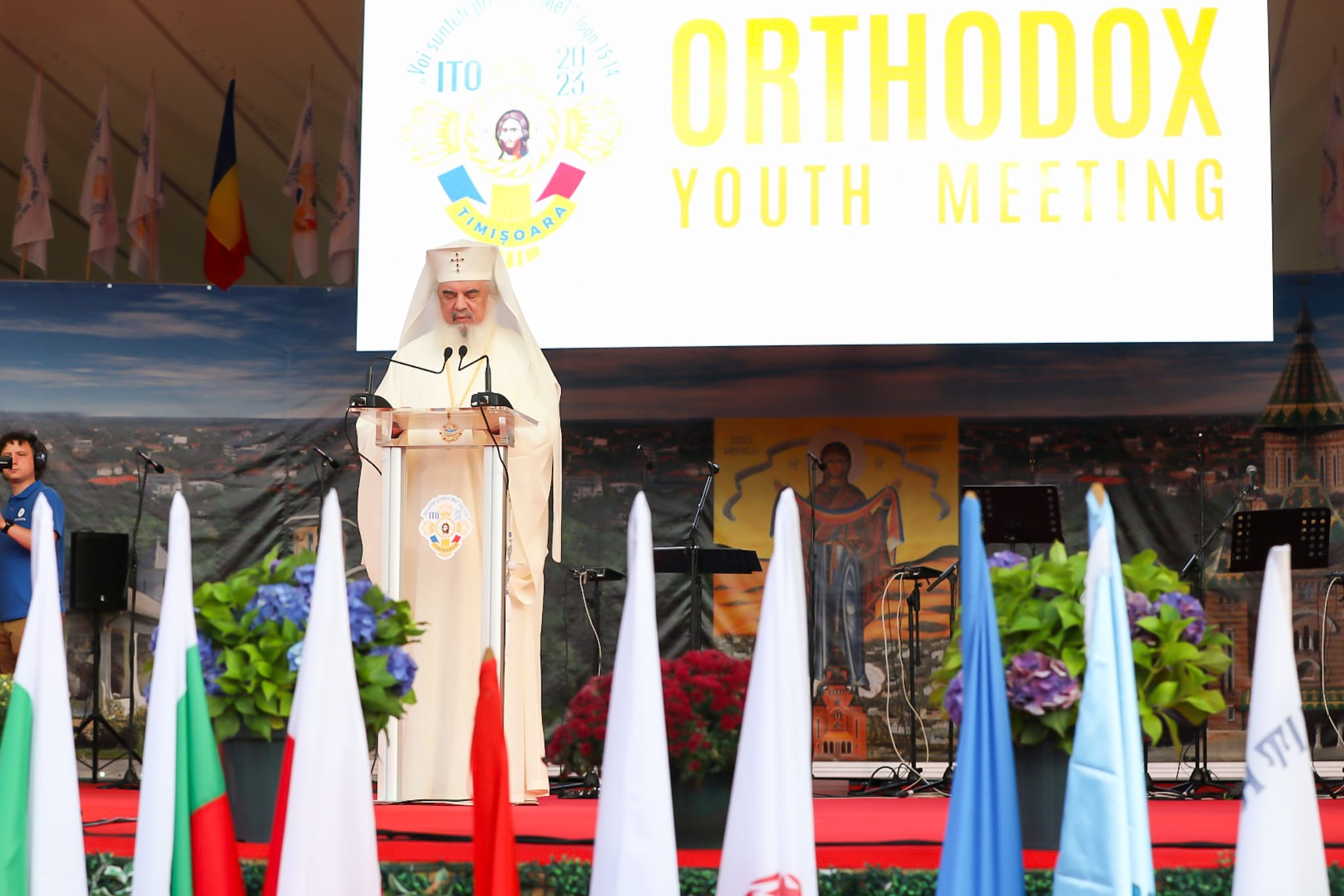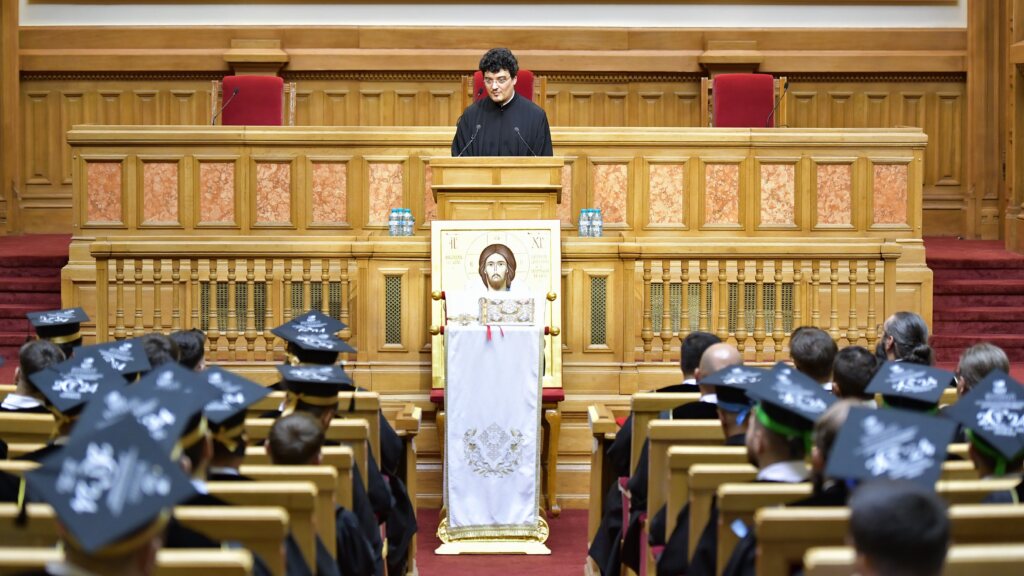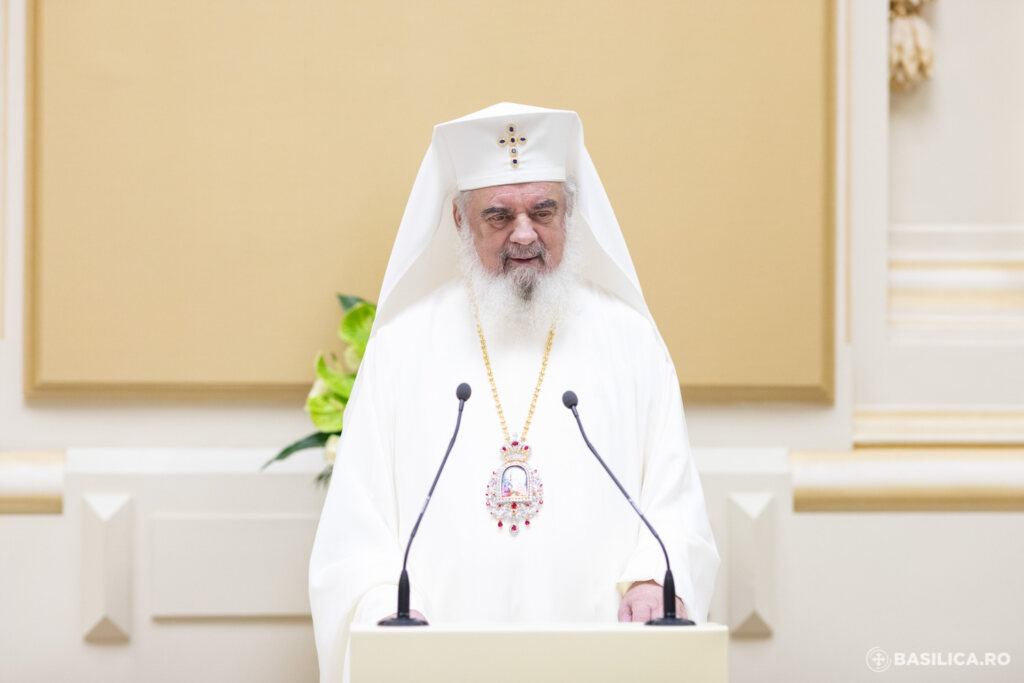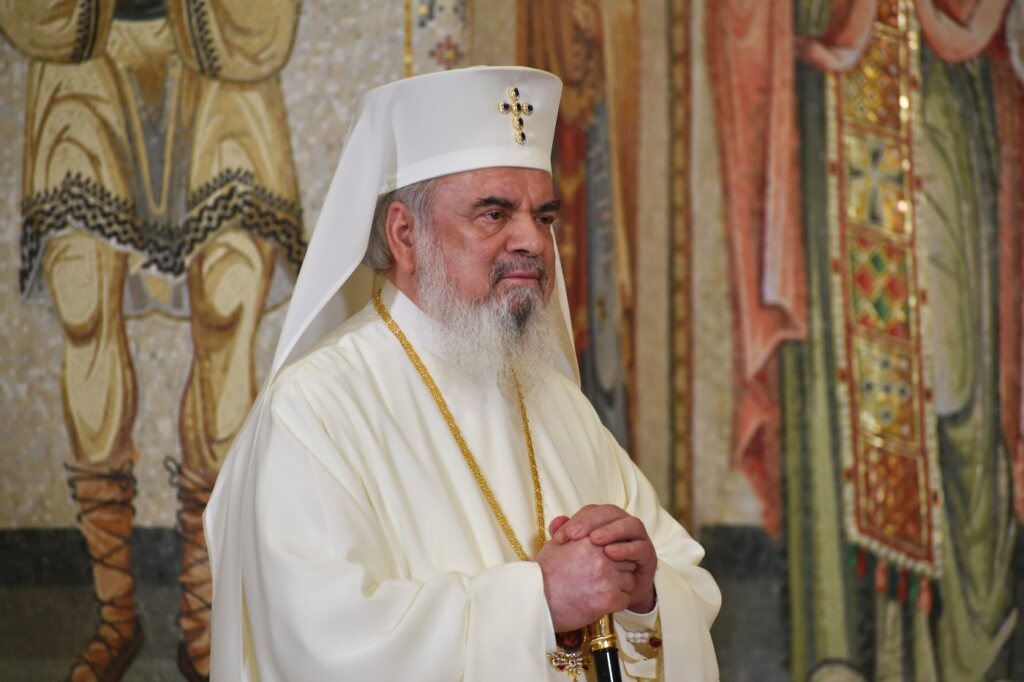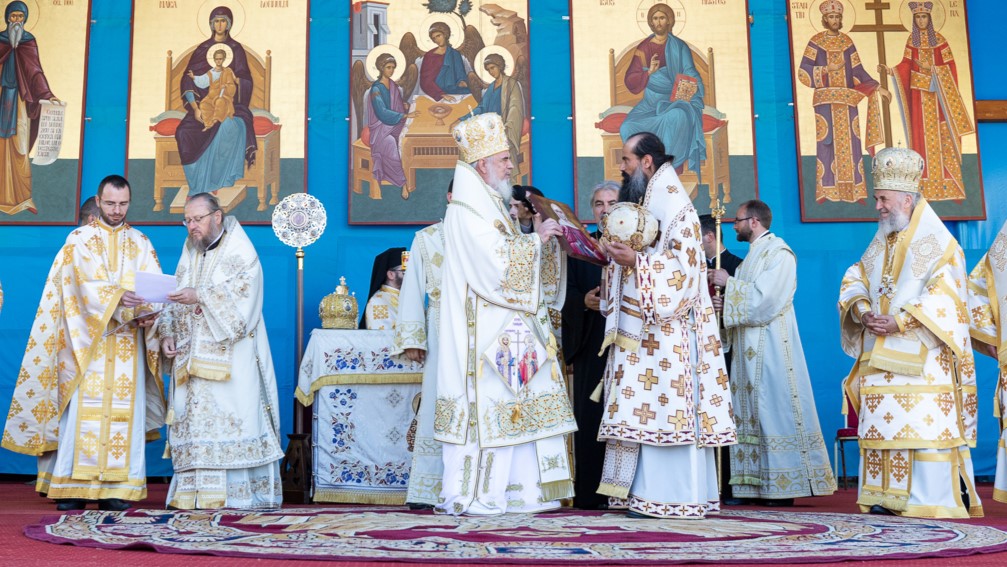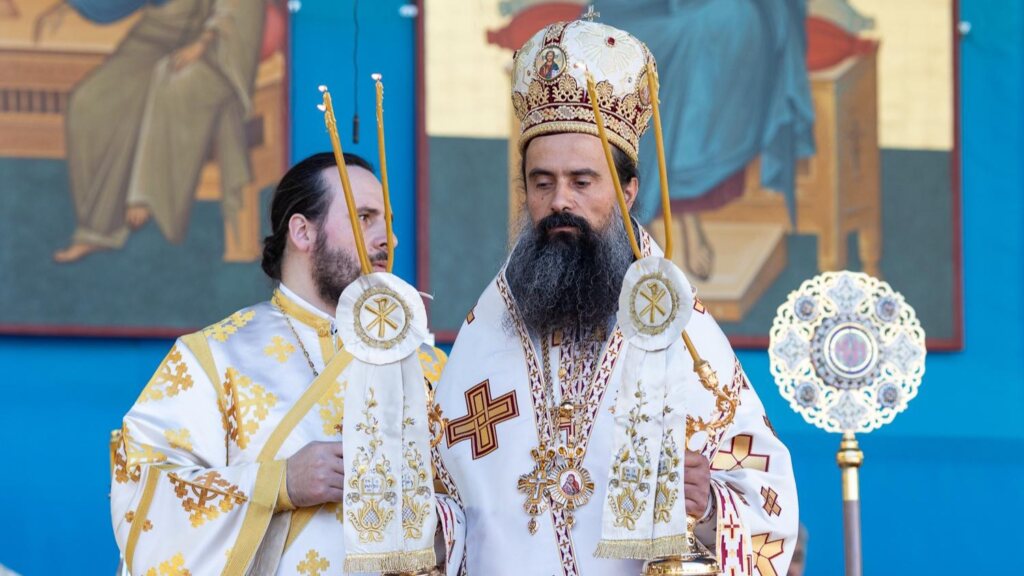Patriarch Daniel of the Romanian Orthodox Church was present on Thursday at the inaugural session of the International Meeting of Orthodox Youth (ITO), held in Timișoara, Romania, between August 31 and September 3, 2023.
His Beatitude spoke of the theme of the event, which is man’s friendship with God, and of the mission of the Church for young people.
Referring to the theme of this year’s edition of the meeting, the Patriarch of Romania said that, “according to the Holy Scriptures and the Holy Fathers of the Church, God’s friendship with people and their friendship with God have as their main and permanent goal the acquisition of eternal life and glory in the Kingdom of God”.
“The Church is called to convey to young people Christ’s love for children and youth and to help them become friends of Christ and friends of everyone, children, young people, adults and elderly, who need the presence and actions of faithful, friendly, prayerful and helpful young people,” added the Patriarch of Romania.
Full text:
God’s friendship with humans is the beginning of eternal joy
The central theme of this International Meeting of Orthodox Youth (ITO) in Timisoara is comprised of the words of the Lord Jesus Christ addressed to His disciples, “You are My friends” (John 15: 14).
I. Friendship in antiquity and in the Holy Scriptures
Since Greco-Roman antiquity, friendship was a virtue highly valued and praised by Plato, Aristotle, Plutarch, Seneca, Cicero, etc. It implies relationships between two or more persons based on reciprocity, openness and equality[1]. Friendship expresses and cultivates relationships of openness (dialogue), trust, recognition of values, fidelity and mutual support[2].
In the Old Testament, the Book of the Wisdom of Sirach (6:14-16) notes: “Faithful friends are a sturdy shelter; whoever finds one has found a treasure. Faithful friends are beyond price; no amount can balance their worth. Faithful friends are life-saving medicine, and those who fear the Lord will find them.” Therefore, this text clearly indicates that only those who fear God are capable of true friendship and only those can be genuine friends[3].
Likewise, the Book of Proverbs praises true friendship as follows: “A friend loves at all times, a brother is born for a time of adversity” (Proverbs 17:17). The same book warns, however, that “One who has unreliable friends soon comes to ruin, but there is a friend who sticks closer than a brother” (Proverbs 18:24).
In particular, the Holy Scripture highlights God’s friendship with Abraham, called God’s friend or beloved (Isaiah 41:8, James 2:23) and “Father of many nations” (Genesis 17:4-6). God calls Abraham to a holy mission, more precisely, He asks him to leave his native land (Ur of the Chaldees) and go to a distant land, unknown to him (Canaan), which God would give him as an inheritance (Genesis 12:1). Through humble faith, Abraham responds to God’s call.
Later, God asks Abraham to sacrifice Isaac, his only son (Genesis 22:1-2). Abraham fulfils the commandment, but instead of Isaac, the angel of the Lord asks him to sacrifice a nearby ram (Genesis 22:11-13). Isaac foreshadowed Jesus Christ, the One who would sacrifice Himself on the wood of the Cross. For his faith and his humble obedience to God, Abraham was considered “God’s beloved or friend” (Isaiah 41:8). This title represents the greatest honour for a man in the Old Testament. Later, Moses was also called “a friend of God,” as well as some other prophets of the Old Testament[4].
The title “friend of God” attributed to Abraham appears only once in the New Testament, namely in the General Epistle of the Holy Apostle James (2:23)[5].
The Holy Church Fathers consider that the blessing of God granted to Abraham to be called His friend and his name meaning “Father of many nations” (Genesis 12:3, 17:4-6) was transferred from Abraham to the disciples of Christ, whom Jesus Christ called “friends” and appointed them “to bear fruit” (John 15:14-16), because He would send them to distant countries and to different nations or peoples (Matthew 28:19) in order to preach the faith in Jesus Christ. Thus, Christ’s apostles have also become “fathers of many nations.”
Highlighting this truth in his Commentary on the Gospel of St. John, St. Cyril of Alexandria († 444) writes: “Therefore it has been said to the mother of the Jews, I mean the synagogue, by the voice of the Psalmist: Instead of fathers thy sons have been born. (Psalms 45:19). For the inspired disciples are truly sons of the synagogue of the Jews, for they were nourished up in the Mosaic usages. They became fathers, holding the position of Abraham, and were the beginning of the spiritual race, and for this reason were ordained as rulers, offering up as a sacrifice the Gospel of Christ in all the world, as did Abraham Isaac as a type of Christ.”[6]
Father Dumitru Stăniloae notes that “Christ calls His disciples and their descendants “friends” because they are able to fulfil His commandment to love Him and to love one another. That is why He revealed to them the highest will of the Father: that of loving Him and loving one another. But the Father also gave people this power, since He made His Son one of us humans. As a man, being able to love God to a higher degree, He gives this power to humans as well. (…). It is the highest honour for humans that God should make them His friends and give them strength and courage to love Him (Christ) as their Brother and Friend (our emphasis).”[7]
Regarding the quality of being a “friend of Christ”, Saint Cyril of Alexandria states: “For see how the reward surpasses the very limits of the nature of man. For the work produced is not on an equality with its producer; and how could it be? But God, Who is over all, will hold sway over and direct His own works.”[8]
This quality or dignity of being “friends of Christ” is therefore offered to His disciples, as conferment or special gift. Father Stăniloae points to the eternal value of this friendship of humans with Christ-God, “People are elevated to friendship and brotherhood with the Son of God, made man for eternity, which implies their eternal advancement in infinite divine goodness.“[9]
In conclusion, we note that according to the Holy Scriptures and the Holy Fathers of the Church, God’s friendship with people and their friendship with God have as their main and permanent goal the acquisition of eternal life and glory in the Kingdom of God, according to the promise of the Lord Jesus Christ: “I am going (to heaven) to prepare a place for you (…), so that you also may be where I am” (John 14:2-3).
II. The life of the Church and everyday life are the environment in which the friendship of believers with Christ God, with His Saints and with people in need is cultivated
Young people are a blessing and joy for the family, the Church and the people. Therefore, the Church is called to convey to young people Christ’s love for children and youth and to help them become friends of Christ and friends of everyone, children, young people, adults and elderly, who need the presence and actions of faithful, friendly, prayerful and helpful young people.
The friendship of the Orthodox youth with the Lord Jesus Christ is cultivated, first of all, through personal and communal prayer, through participation in the Divine Liturgy and other services of the Church, because, as Saint Isaac the Syrian says, “pure love is born from prayer“. More precisely, through prayer, the Christian’s soul is filled with the humble and merciful love of Christ, and the hands of the praying Christian can become “the hands of the merciful love of Christ” shown to people in spiritual and material needs.
The numerous activities carried out so far by the Orthodox youth demonstrate that they understand and live to a large extent the holy connection that exists between Liturgy and philanthropy, between prayer and Christian action, because, as Father Stăniloae said, “The Holy Mysteries of the Church are the multiple offering of Christ to people.”
Moreover, Saint John Chrysostom urges us to see the mystical presence of Christ in our suffering neighbour, who is poor or sick, sad or discouraged, and to respond with humble and merciful love, as this is the only criterion for the final judgment or evaluation of human life on earth (Matthew 25:31-46).
In conclusion, we note that man’s friendship with God, through prayer, and with his fellow people, through good deeds, is the surest light of life, the light that everyone will bear in their souls at any age, in any place, in time and in eternity.
For the joy of ecclesial communion, we thank His Eminence Metropolitan Ioan of Banat, all the organisers of this International Meeting of Orthodox Youth in Timisoara, as well as all the participants, clergy, laity and especially the young people from our Church and from other Sister Orthodox Churches.
We pray to the Most Holy Trinity, the Mother of God and all the Saints to help us all to become as much as possible “friends of Christ“, to always remain young and joyful in the Lord, according to the apostolic exhortation: “Rejoice in the Lord always. I will say it again: Rejoice!” (Philippians 4:4).
With paternal blessings,
† Daniel
Patriarch of the Romanian Orthodox Church
NOTES
[1] Michael Theobald, art. „Freundschaft”, in „Lexikon für Theologie und Kirche” vierter Band, Verlag Herder in Freiburg im Breisgau, 2017, col. 132.
[2] Wolfgang Krone, art. „Freundschaft”, in „Lexikon für Theologie und Kirche”, col. 134.
[3] See φίλος, φίλη, φιλἱα (friendship) in „Theological Dictionary of the New Testament”, Edited by Gerhard Friedrich, Volume IX, Michigan, 1974, p. 157.
[4] See Theological Dictionary of the New Testament, p. 168.
[5] Theological Dictionary of the New Testament, p. 167.
[6] St Cyril of Alexandria, Commentary on John, translated by T. Randell, Book 10, vol. 2, https://tinyurl.com/4cf28fze.
[7] Fr. Dumitru Stăniloae in Sfântul Chiril, Arhiepiscopul Alexandriei, Comentariu la Evanghelia Sfântului Ioan, [St Cyril of Alexandria, Commentary on the Gospel of John], Bucharest 2022, note 307, p. 300.
[8] St Cyril of Alexandria, Commentary on John, translated by T. Randell, Book 10, vol. 2, https://tinyurl.com/4cf28fze.
[9] Fr. Dumitru Stăniloae in Sfântul Chiril, Arhiepiscopul Alexandriei, Comentariu la Evanghelia Sfântului Ioan, [St Cyril of Alexandria, Commentary on the Gospel of John], Bucharest 2022, note 302 pp. 297-298.
Photo credit: Basilica.ro / Mircea Florescu
Follow us on Twitter: @BasilicaNews
